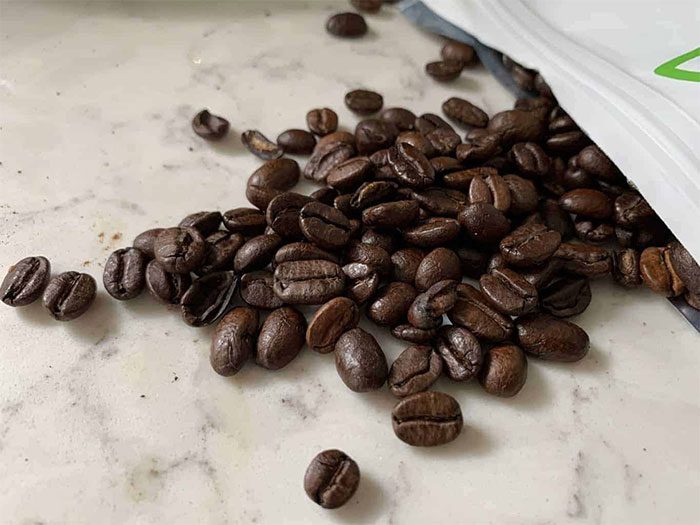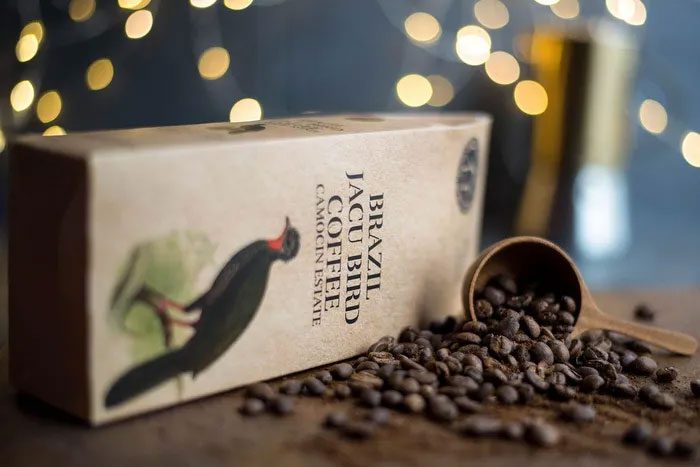Few people know that one of the most expensive and sought-after coffees in the world is harvested from the droppings of the Jacu, a large black bird similar to a pheasant, whose digestive system imparts a unique aroma to the coffee beans.
Jacu Bird Coffee is one of the most expensive coffees in the world, sold at around $1,700 per kilogram.
Jacu Bird Coffee is considered one of the rarest and most expensive coffees globally. It is made from coffee cherries that the Jacu bird eats, digests, and excretes.
With an area of about 50 hectares, Camocim Estate is one of the smaller coffee plantations in Brazil, but it still reaps substantial profits thanks to its unique and sought-after coffee variety.
It all began in the early 2000s when Henrique Sloper de Araújo woke up to find that his precious plantations had been ravaged by Jacu birds, a protected species in Brazil.

The roasted coffee beans have a unique and appealing flavor. (Illustrative image).
Initially, Henrique Sloper de Araújo tried to scare the birds away from his plantation and even called environmental police, but no one could help him.
This bird species is protected by law, so he could not harm them in any way. But then an idea sparked in his mind, and desperation turned into excitement.
In his youth, Sloper was an avid surfer, and chasing waves had once taken him to Indonesia, where he learned about kopi luwak, one of the most expensive coffees in the world, made from coffee beans harvested from the droppings of the civet cat.
This inspired Sloper to come up with an idea. If Indonesians could harvest coffee cherries from civet droppings, he could do the same with Jacu droppings.
“I realized I could try something similar with the Jacu, but coming up with the idea was only half the battle,” Henrique Sloper de Araújo told Modern Farmer.
“The real challenge lay in convincing my coffee pickers that instead of picking coffee cherries, they needed to hunt for bird droppings.”
Clearly, Sloper had to turn the search for Jacu droppings into a treasure hunt for the workers, offering them financial incentives to find a certain quantity of discarded coffee beans.
However, collecting Jacu droppings was just the beginning of a very labor-intensive process. The coffee cherries then had to be extracted from the droppings by hand, washed, and separated from their protective coverings. This labor-intensive work significantly increases the cost of Jacu Bird Coffee compared to other types of coffee, but that is not the only factor.
Henrique Sloper de Araújo believes that the Jacu birds only eat the ripest and best-quality coffee cherries they find, something he has observed firsthand.
“I was quite surprised to observe from my living room that the Jacu birds would only choose the ripest berries to eat, leaving behind more than half of the bunch, even the ones that looked perfect to the human eye,” said the owner of Camocim Estate.
Unlike kopi luwak, where the coffee beans are digested by civet cats, the beans pass more quickly through the digestive system of the Jacu and are not broken down by animal proteins or stomach acids. The collected coffee beans, when roasted, have a unique and appealing flavor.

Coffee from Jacu droppings. (Photo: Imperial Teas).
The state of Espírito Santo in Brazil is the fourth largest coffee producer in the world, but Camocim Estate is the only farm that uses Jacu droppings to produce coffee. For the past decade, this coffee has been regarded as one of the most expensive in the world and is especially popular in countries like France, Japan, and the UK, selling for around $1,700 (nearly 40 million VND) per kilogram. This coffee is highly sought after by connoisseurs.
- A Special Fruit That Has Existed for 3,000 Years, Tasty and Promoting Youthful Skin
- Measurement Error Leads to Ground Staff Causing Plane to Crash Due to Running Out of Fuel Mid-Flight
- While Fishing in the River, a Farmer Accidentally Catches a “National Treasure” Turtle “Mysteriously” with Four Arrows Stuck in Its Back





















































